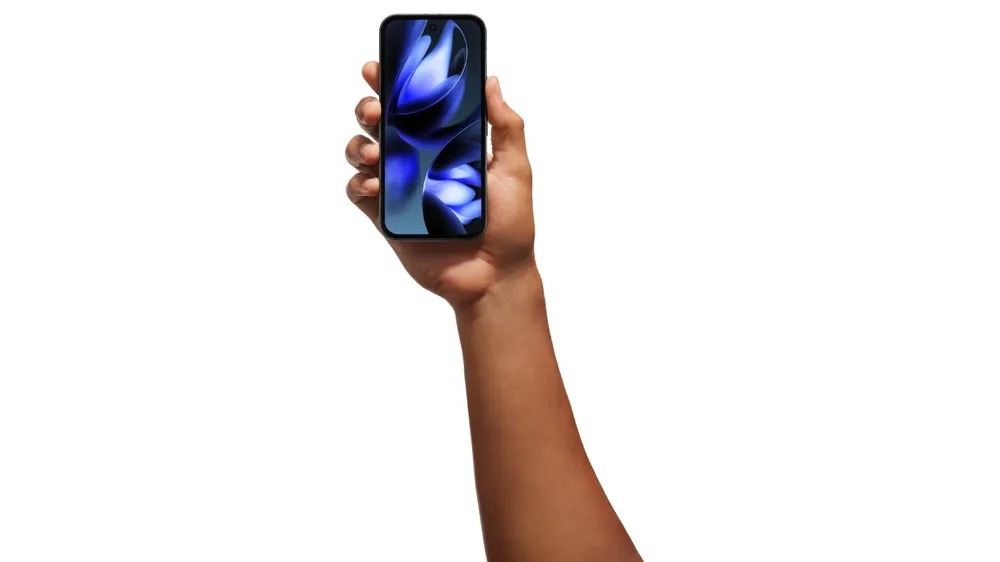Laptop Mag Verdict
As the first multi-mode Ultrabook, the Windows 8-powered Lenovo IdeaPad Yoga delivers new levels of versatility.
Pros
- +
Flip design adds high level of versatility
- +
Sharp, colorful display
- +
Solid performance and graphics
- +
Comfortable keyboard and touchpad
- +
Better battery life than other Windows 8 convertibles
Cons
- -
Power button hard to locate
- -
Heavy and a bit awkward as a tablet
Why you can trust Laptop Mag
Lenovo's latest Ultrabook will literally bend over backward for you. The Lenovo IdeaPad Yoga ($999; $1,099 as configured) switches from a laptop to a tablet, and a variety of other poses, with a quick fold of the lid. Add in a comfortable keyboard and a sharp 1600 x 900-pixel display and you've got a lightweight convertible that can go from business to party in less than a second. Find out if this bendable laptop is a godsend or gimmick for multitasking road warriors.
[sc:video id="h1bnA1cTr7rZeHJco3TP1EcOU5_wOdUb" width="575" height="398"]
Design
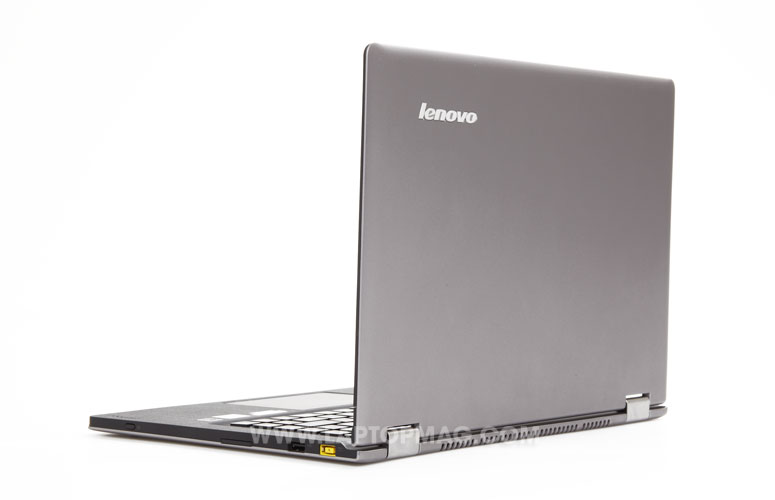
Click to EnlargeGentle, rounded curves and alluring surfaces? Sign us up. The Yoga's chassis is swathed in a voluptuous, gray, soft-touch finish whose hue doesn't stand out, but whose surface certainly feels great to the touch. Lenovo eschews ostentation, choosing a chrome Lenovo logo in the top right corner as its sole adornment. The pair of matte-silver, chrome hinges is both sturdy and elegant.
The notebook's interior sports more of the same soft-touch finish, but this time it's done in black and has a textured-leather motif. The keyboard sits in a recessed well, and a small IdeaPad insignia is etched into the lower right corner. The power button, normally above the keyboard, sits on the left front lip, along with the OneKey Recovery button and battery status light. This power button placement makes it easier to turn the Yoga on and off when in tablet mode, but the majority of the time you'll use this device in notebook mode.
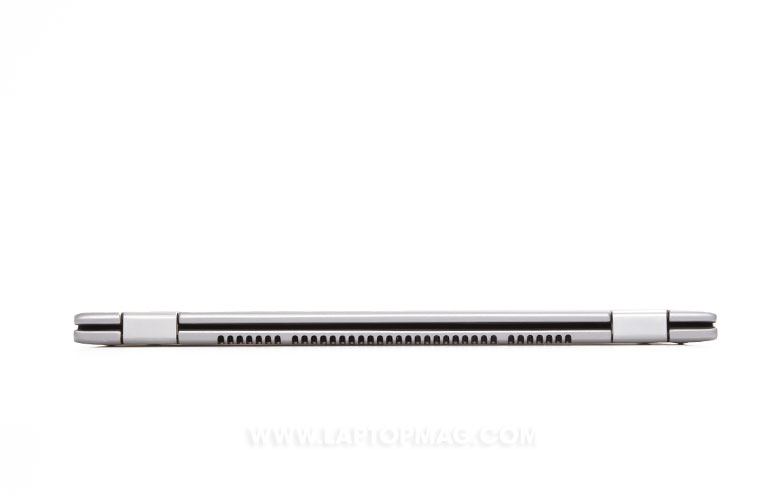
Click to EnlargeThe 3.4 pound, 13.1 x 8.9 x 0.67-inch Yoga is on the heavier side of the Ultrabook spectrum due to its included touch screen and flip hinge. The Dell XPS 12 (3.4 pounds, 12.5 x 8.5 x 0.6 - 0.8 inches) is isimilar in size and weight. Among ultraportables with touch screens, the 12.5 x 8.5 x 0.6 - 0.8-inch Toshiba Satellite U925t (3.2 pounds) is lighter, but has a smaller, 12.5-inch screen. The new king of slim is the 2.8-pound, 12.7 x 8.8 x 0.46-inch Acer Aspire S7; that Ultrabook has a touchscreen, but is not a convertible.
MORE: 20 Sexiest Laptops of All Time
Multi-mode
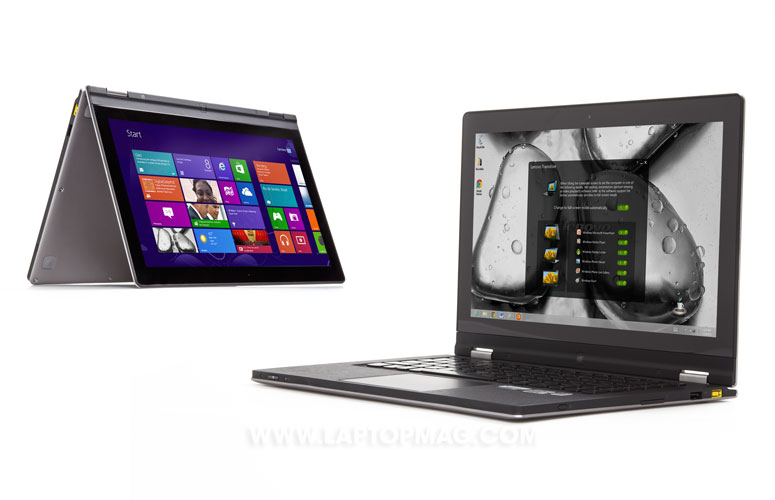
Click to EnlargeLenovo takes flexibility to a new level with the Yoga. Thanks to those stylishly functional hinges, the Yoga can bend 360 degrees, allowing the notebook to fold into four modes (Notebook, Tablet, Tent and Stand). Notebook mode is the traditional screen-and-keyboard setup we've come to rely on for productivity tasks. Stand mode flips the keyboard under the display; Lenovo says this mode is best in tight spaces such as on airline tray tables. Tent mode, as its name suggests, turns the notebook into an upside-down V; it really came in handy when we needed to check our recipe for triple cheese mushroom herb mac & cheese in the kitchen. Lastly, there's Tablet mode, which folds the keyboard flush with the lid, so that both the keyboard and display are exposed.
Switching between the four modes is relatively smooth. We found ourselves using Tablet mode the most when we weren't using the notebook for work. We love the additional tablet real estate that a 13-inch display provides. Being able to feel the keyboard (which is deactivated in any mode but Notebook) along the back was awkward, but our discomfort faded after a few days of use.
Display and Audio
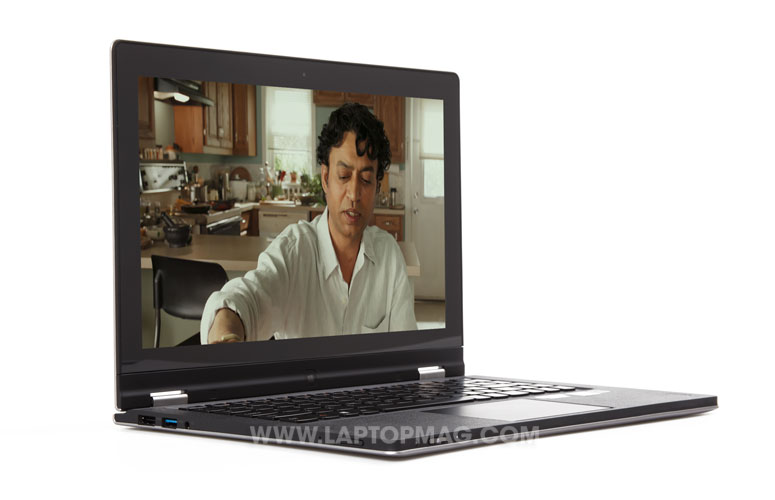
Click to EnlargeWe enjoyed using the Yoga's 13.3-inch, 1600 x 900p IPS display to navigate Windows 8 and view content. The 1080p trailer of "Life of Pi" was a feast for the eyes. The climax came when the whale breached the water, leaving a trail of ethereal green light over Pi. We watched the water cascade gently over the massive mammal, spellbound. Viewing angles were nice and wide with mimimal color loss.
Text on CNN.com and Polygon.com was crisp. Navigating Windows 8 felt slick and responsive. The fun only increased when we switched to tablet mode. We resized Live Tiles with ease and scrolled through our open programs with effortless swipes.
However, the display could be brighter. Its brightness of 281 lux is enough to beat the 237 lux category average and the Acer Aspire S7 (215 lux), but it's well below that of the XPS 12 and the UX31A, which measured 434 and 423 lux, respectively. In addition, while more expensive, the Acer and Dell sport full HD screens.
The Yoga's speakers filled our test room with loud, albeit tinny audio. French Montana's "Pop That" was devoid of bass and sounded flat, even though we used the Dolby Home Theater v4 software. The notebook fared better on the highs and mids of Soft Cell's 80's classic, "Tainted Love." We found the Music preset on Dolby Home Theater v4 software delivered the best combination of volume and clarity.
Lenovo Motion
Click to EnlargeTouch isn't the only way to control the IdeaPad Yoga. The Lenovo Motion application works in tandem with software such as PowerPoint or Windows Photo Viewer. Once we launched these programs, the webcam switched on and followed our hand movements. For example, we were able to scroll through photos and slides with a simple wave of the hand. The camera easily followed our movements and supplied a far superior experience to Sony's gesture-control software.
Windows 8
Click to EnlargeThe IdeaPad Yoga runs Windows 8, Microsoft's new operating system. This OS combines the traditional Windows desktop with the Live Tile Start screen and Modern Interface.
The tiles, spread across the display, are divided into three sections: Windows apps, Lenovo apps and apps we installed. We added more tiles by swiping down on the display and tapping the All Apps button. From there, we swiped down on an app to call up a series of options (Pin to Start, Pin to Taskbar, Open in New Window and Open File Location). Due to the difficulty of accessing Windows utilities such as Control Panel, My Computer and Paint, we highly recommend pinning them to the Start screen.
A right swipe summons the Charms menu. A slim black bar on the right displays icons for Search, Share, Start, Devices and Settings. There's also a large black box with date and time, battery and Wi-Fi status. Swiping left lets us cycle between open windows and apps. A fluid left-to-right-and-right-again swipe shows thumbnails of the five most-recently used apps.
Selecting the Desktop tile took us to a Windows 7-like desktop screen. However, an Internet Explorer icon now sits in what used to be the Start menu position. Mousing over the bottom left corner summons an icon to return you to the Modern UI Start screen.
MORE: Top 25 Windows 8 Apps
Apps
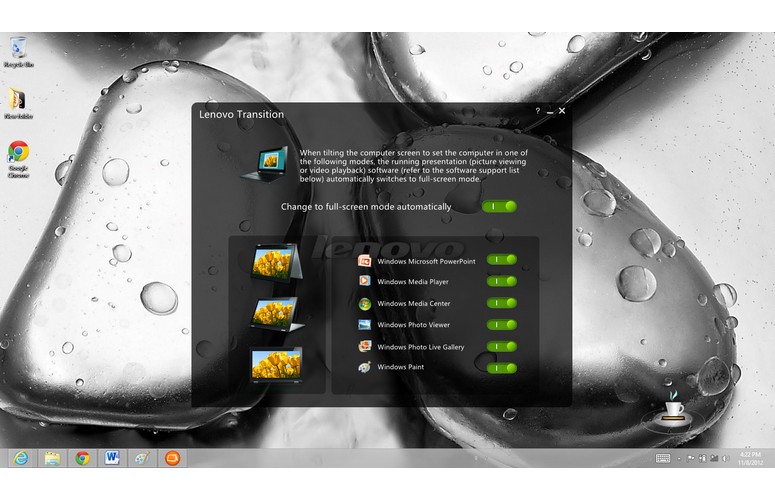
Click to EnlargeLenovo doesn't weigh the Yoga down with flotsam. Lenovo Transition lets users select which applications will automatically switch to full screen when alternating modes. Applications include PowerPoint, Media Player Paint, and Windows Media Center. Lenovo Support offers a number helpful utilities, such as a digital user guide and the Lenovo forums.
We immediately got sucked into "Birzzle," a colorful puzzle game that draws influences from "Angry Birds" and "Bejewelled." The task of matching three or more of the same color birds before the screen filled was engrossing and entertaining.
Third-party apps include eBay, Amazon Kindle, SugarSync, Evernote and Skype, along with shortcuts to Accuweather.com and music-streaming service rara.com. There is also a 30-day free trial of McAfee Security Advisor.
Keyboard and TouchPad
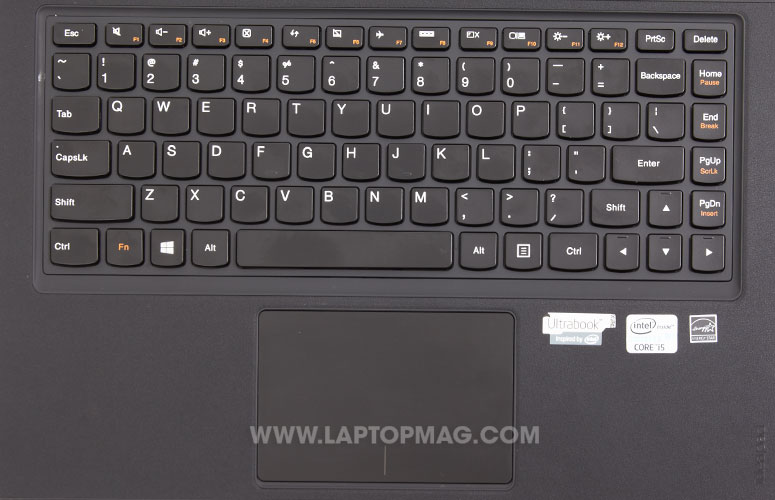
Click to EnlargeThe IdeaPad Yoga features Lenovo's AccuType keyboard, which consists of large, matte-black keys with slight curves at the bottom. Similar to other Lenovo keyboards, the Yoga's keyboard delivered firm travel. We hit our usual 50 wpm with a 1-percent error rate on the Ten Thumbs Typing Test.
Our fingers sailed gently over the black 4.2 x 2.75-inch Synaptics touchpad. We experienced little-to-no difficulty performing the normal multitouch gestures (pinch-zoom and two-finger scroll). Windows 8 gestures, such as dragging down from the top of the screen to exit a program or calling up the Charms menu, were equally smooth. The bottom edges of the touchpad delivered firm, springy feedback and accurately performed left- and right-click functions.
Heat
We measured the Yoga's temperature after watching 15 minutes of "Code Monkeys" on Netflix. The touchpad, space between the G and H keys, and bottom of the Yoga registered a cool 75, 79 and 83 degrees Fahrenheit, respectively. A space near the bottom vent measured 93 degrees, which felt warm, but fell below our 95-degree threshold for feeling uncomfortable.
Ports
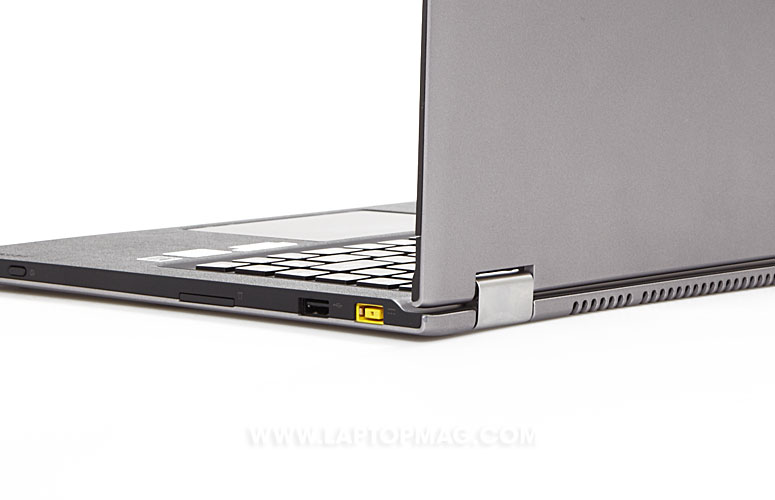
Click to EnlargeA USB 2.0 port, 2-in-1 card reader, an Auto-Rotate button and a proprietary charge port sit on the Yoga's right side. The left side houses a USB 3.0 port, HDMI, a combination microphone/headphone jack and a volume rocker. We appreciated the placement of the volume and auto-rotate buttons when we switched to tablet and stand mode. However, these buttons were a little difficult to reach in stand mode.
Webcam
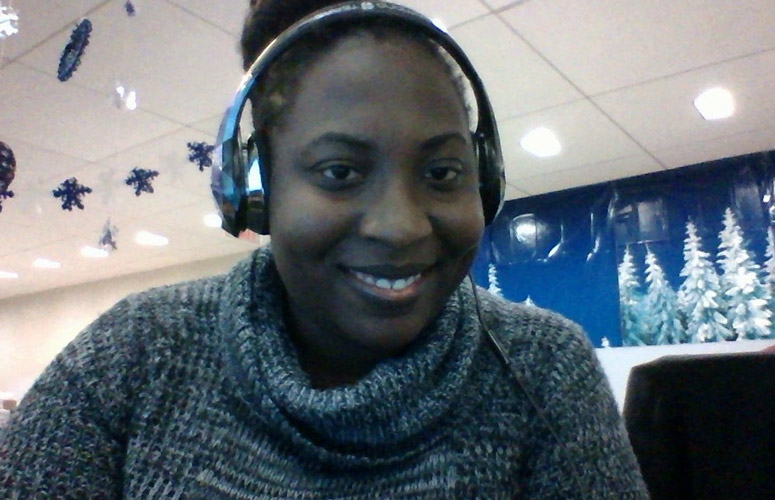
Click to EnlargeImages captured by the 720p webcam on the IdeaPad Yoga were rather dark using the preloaded YouCam software. The shots were also very grainy, greatly diminishing the shiny facets on our Monster Diamond Tears headphones.
Performance
The Lenovo IdeaPad Yoga packs a 1.7-GHz Intel Core i5-3317U CPU, 8GB of RAM and a 128 GB solid-state drive, the same components found on many Ultrabooks in this price range. During our real-world testing, we smoothly streamed a movie on Netflix while running a virus scan in desktop mode with eight open tabs in Internet Explorer, Mozilla Firefox and Google Chrome.
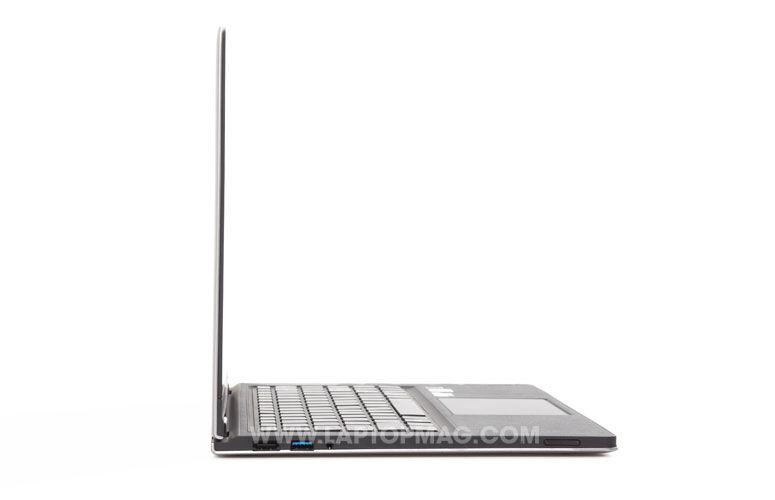
Click to EnlargeOn the PCMark 7 benchmark, the Yoga notched a 4,419 score, placing it well above the 3,156 ultraportable average. The Dell XPS 12 and the Toshiba Satellite U925t, which also have 1.7-GHz Intel Core i5-3317U processors, scored 4,727 and 4,419, respectively. However, the ASUS Zenbook Prime UX31A and its 1.9-GHz Intel Core i7-3517U CPU reigned supreme, with a 4,989 score.
The Yoga's 128GB SSD duplicated 4.97GB of multimedia files in 42 seconds, which equals a transfer rate of 121 MBps. That is comfortably above the 76 MBps category average. By comparison, the UX31A and its 256GB SSD notched 51.4 MBps. The XPS 12 and U925t (128GB SSD) both scored a higher 149.7 MBps.
The IdeaPad Yoga impressed us in the boot test, loading Windows 8 in an agile 10 seconds, blowing past the 38-second average. The Satellite U925t, XPS 12 and Zenbook Prime UX31A booted in 14, 15 and 23 seconds, respectively.
During the OpenOffice Spreadsheet Macro Test, the Yoga matched 20,000 names to their corresponding addresses in 6 minutes. It easily outpaced the 7:23 ultraportable average, but that wasn't enough to beat the UX31A, which finished with 4:59. The XPS 12 scored 5:34, while the U925t clocked in with 5:54.
MORE: Laptop Buying Guide 2013: 8 Essential Tips
Graphics
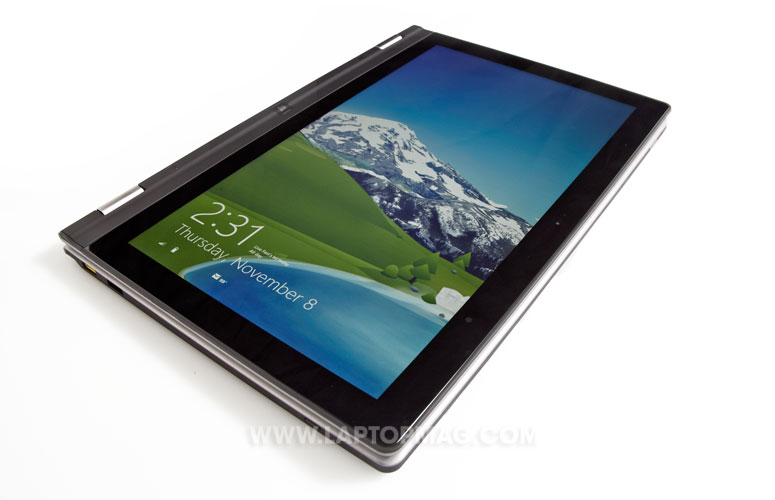
Click to EnlargeThanks to its Intel HD Graphics 4000 card, the IdeaPad Yoga is relegated to casual and other non-taxing games. It's score of 530 on 3DMark11 is less than the 777 average, but on par with other notebooks that have similar specs. For example, the Dell XPS 12, ASUS Zenbook Prime UX31A and Toshiba Satellite U925t, all of which have Intel HD Graphics 4000 GPUs, notched 602, 594 and 553, respectively.
When we ran the "World of Warcraft" benchmark, the Yoga supplied a playable 30 fps frame rate at 1600 x 900 on autodetect. That showing was enough to beat the U925t's 26 fps (1366 x 768) and the XPS 12's 14 fps (1920 x 1080). But it wasn't enough to top the UX31A's 36 fps (1920 x 1080). On maximum, the Yoga's frame rate dropped to an unplayable 12 fps.
Battery Life
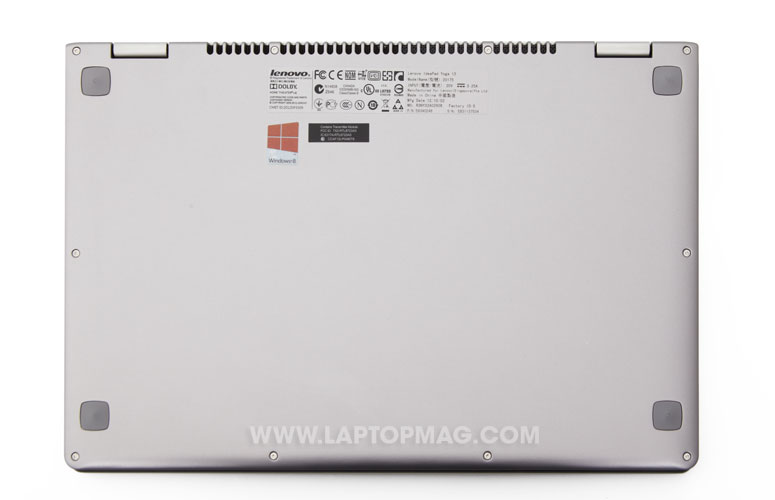
Click to EnlargeOn the Laptop Battery Test (Web surfing via Wi-Fi), the Yoga lasted 6 hours and 18 minutes, which is on a par with the category average of 6:21, and just a few minutes shy of the ASUS UX31A (6:28). By comparison, the Dell XPS 12 lasted 5:46, but the MacBook Air lasted 8:10.
MORE: 10 Laptops with the Longest Battery Life
Warranty
The Lenovo IdeaPad Yoga comes with a one-year warranty. See how Lenovo fared in our annual TechnSupport Showdown and Best and Worst Brand report.
Configuration Options
Our $1,099 review unit of the IdeaPad Yoga features a 1.7-GHz Intel Core i5-3317U CPU, 8GB of RAM, a 128GB SSD and an Intel HD Graphics 4000 GPU. The $999 model offers a 1.8-GHz Intel Core i3-3217U processor and 4GB of RAM, while the $1,299 version has a 1.9-GHz Intel Core i7-3517U CPU and 8GB of RAM.
Verdict
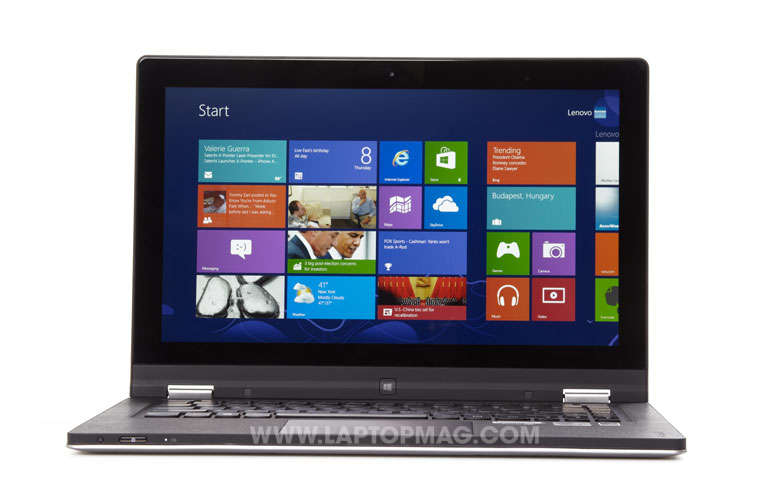
Click to EnlargeThe IdeaPad Yoga is an able contortionist, blurring the line between laptop and tablet, while enabling users to explore the full capabilities of Windows 8. The soft-touch design, comfortable keyboard and swift performance also impresss. Those willing to spend $200 more may prefer the Dell XPS 12, which sports a brighter and higher-res 1080p screen and whose design makes it easier to switch from notebook to tablet mode. However, the Yoga's more versatile design lets you use this device in more ways, and it lasts longer on a charge. Plus, the price of this touch converible undercuts the competition. With the Yoga, Lenovo has succesffully stretched our idea of what a notebook can be and what it can do.
Lenovo IdeaPad Yoga Specs
| Bluetooth | Bluetooth 4.0 |
| Brand | Lenovo |
| CPU | 1.7-GHz Intel Core i5-3317U |
| Card Slots | 2-1 card reader |
| Company Website | http://www.lenovo.com |
| Display Size | 13.3 |
| Graphics Card | Intel Graphics HD 4000 |
| Hard Drive Size | 128GB |
| Hard Drive Speed | n/a |
| Hard Drive Type | SSD Drive |
| Native Resolution | 1600x900 |
| Operating System | Windows 8 |
| Optical Drive | None |
| Optical Drive Speed | n/a |
| Ports (excluding USB) | USB 3.0, Headphone/Mic, HDMI |
| RAM | 8GB |
| RAM Upgradable to | 8GB |
| Size | 13.1 x 8.9 x 0.67 inches |
| Touchpad Size | 4.2 x 2.75 inches |
| USB Ports | 2 |
| Weight | 3.4 pounds |
| Wi-Fi | 802.11b/g/n |
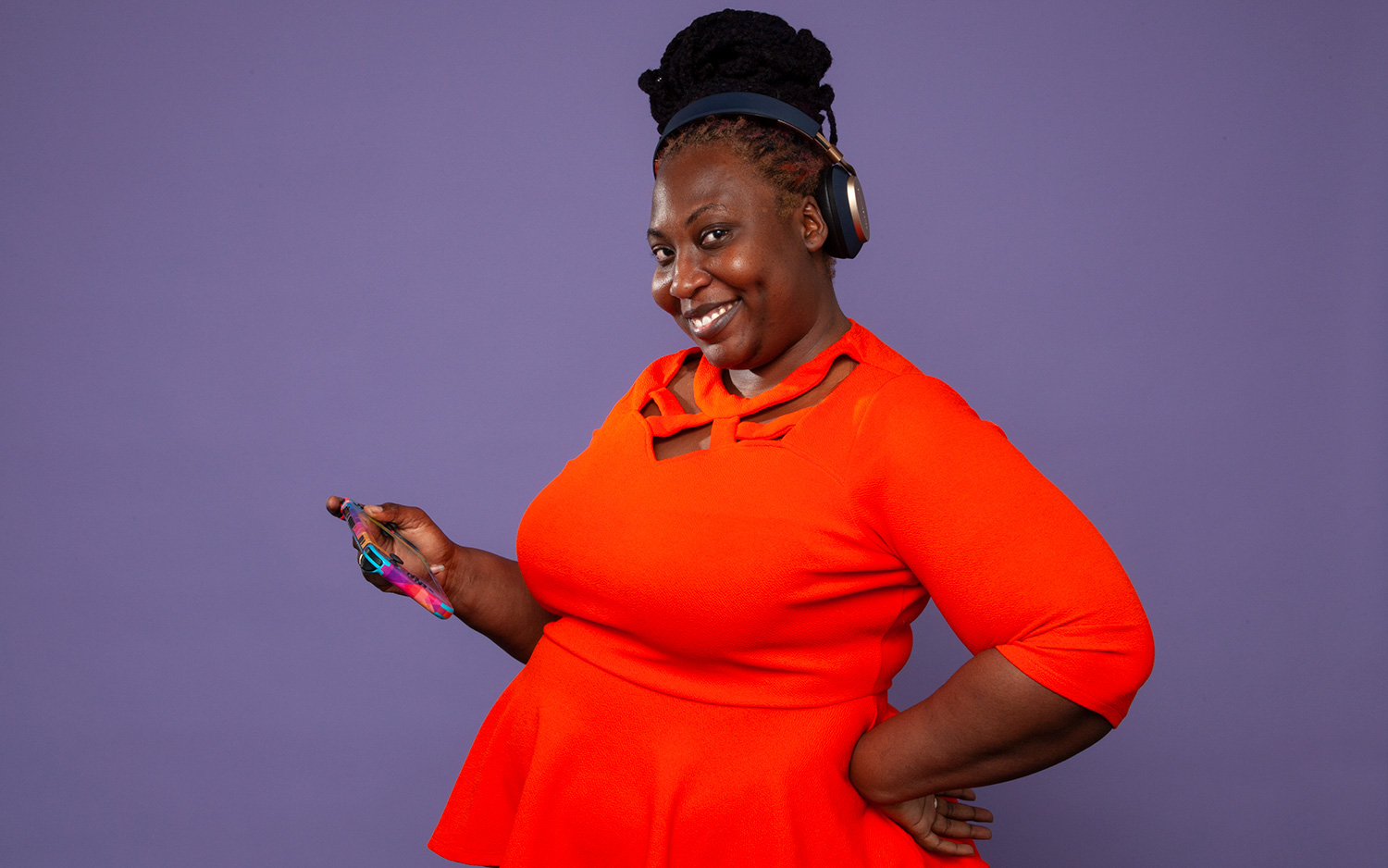
Sherri L. Smith has been cranking out product reviews for Laptopmag.com since 2011. In that time, she's reviewed more than her share of laptops, tablets, smartphones and everything in between. The resident gamer and audio junkie, Sherri was previously a managing editor for Black Web 2.0 and contributed to BET.Com and Popgadget.
